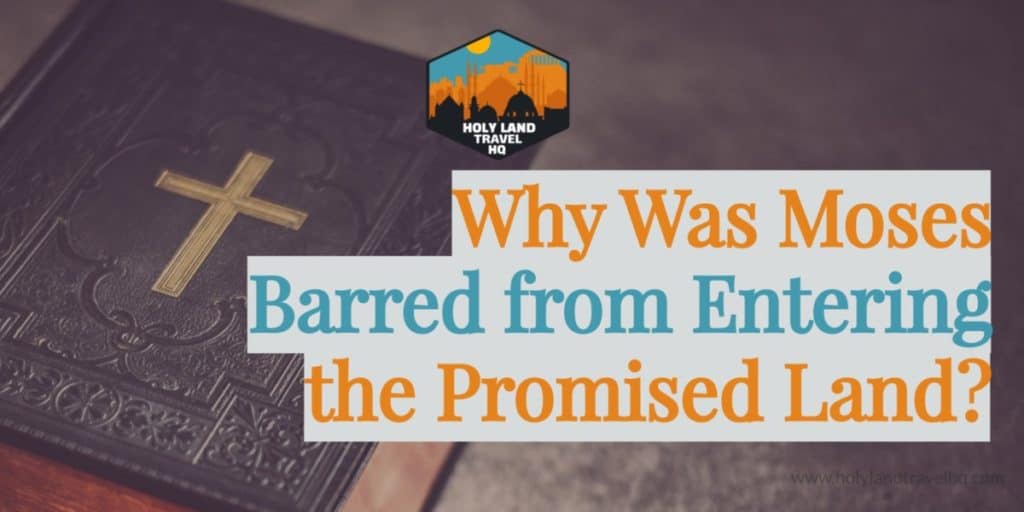
As the Israelites stood at the threshold to the Promised Land, Moses went to God with a request. He asked if he could see the land from afar. For most Christians, it’s known that Moses was barred from entering Canaan, better known as the Promised Land. I’ve always accepted it as a logical result of Moses’s responsibility as a leader. Most Christians, to my knowledge, are in the same camp. But it might not be clear, exactly, why this is the case.
So, why was Moses barred from entering the Promised land. First, as the leader, Moses was held accountable for the sin and grumbling of the Israelites. And second, Moses made a selfish and critical error in executing one of God’s miracles.
To some, this might sound petty of God. But to those who have ever been in a critical leadership position, we know where this road leads. Not following orders, or even letting negativity taint the message never ends well for anyone.
Note: all Bible verses are linked to go to Biblegateway.com.
The Spies.
Numbers 13 tells the story of the spies who are sent into the land of Canaan to investigate it. They were tasked with finding out how fertile the land was. And what it offered. Was the land abundant with life, with things such as trees and fruit? Were the current occupants strong or weak? How were they postured militarily?
Each tribe offered up one spy to make the journey and report back. In total, twelve spies reported for duty. Moses issued their orders and sent them on their way. After forty days, the spies returned.
When the spies gave their report, they described a land flowing with ‘milk and honey.’ They showed Moses some fruit they had retrieved. But then they went on about the fortified cities and large brutish people who occupied the land.
Not long into the diatribe, another spy, a man named Caleb spoke up. “We should go up and take possession of the land, for we can certainly do it” (Numbers 13:30). Caleb didn’t like the negative talk. He believed that God would lead the Israelites to victory no matter how daunting the task looked.
But the naysayers repeated their stance. “The land we explored devours those living in it,” they said (Numbers 13:32b). The people began to rebel against Moses and Aaron. They desired to return to Egypt, where at least they knew they would live a little while longer.
Then Joshua spoke up, “the land we passed through and explored is exceedingly good” (Numbers 14:7). He and Caleb tore their clothes. They appealed to the people to trust in God’s plan. But the people didn’t have it.
When negativity cultivates sin.
In the tent that evening, the people began to talk of mutiny (Numbers 14). Moses and Aaron fell facedown in a plea to God. Though God had not responded yet, Moses knew He would be unhappy with the direction the discussion had gone.
Then God’s Glory showed up (Numbers 14:10). He only addressed Moses, though, because Moses was the leader. At the moment, God was holding Moses accountable. For the Israelites, and all of us reading, class was and is in session. This is Classic Leadership 101.
Up until this moment, God had only talked to Moses alone. But suddenly, God was addressing Moses in the presence of the Israelites. And for the first time, the Israelites experienced God like Moses had been experiencing Him. This is called ‘empowering your subordinate leaders.’
Sometimes leaders come across hurdles. Whether they be noncompliant subordinates or personal flaws, obstacles will always appear. Senior leaders can empower subordinate leaders in many ways.
In front of the Israelites, God speaks to Moses. Though the conversation was with Moses, he was also implicitly telling the Israelites, “I chose Moses to lead, and now he has to answer for your sins. Why do you not listen to him?”
For their disbelief, God tells Moses that he will strike everyone down.
Is God angry, or is He teaching us something?
Moses pleads with God because He is understandably angry. But God is also teaching Moses, the Israelites, and us something.
In the presence of the Israelites, God allows Moses to show why he’s worth following. God listens to Moses and changes His mind. No one over the age of twenty will enter the Promised Land except for Joshua and Caleb.
The difficulty of this passage is that it doesn’t explicitly state that Moses is barred from entering the Promised land. But it is implicit. Only Joshua and Caleb are on the exceptions list, Moses and Aaron aren’t. But why?
The reason Moses is barred from entering the Promised Land is that he asked God to forgive the people. In front of the Israelites, Moses sticks his neck out. He puts himself in the hotseat instead of the Israelites, as a leader should do. And God acknowledges Moses’s sacrifice with both forgiveness and punishment.
One thing to note here, is that Moses does not confront or push back on God. He does not arrogantly attempt to shame God for what the Israelites believe is a seemingly ill-conceived plan. Moses appeals to God and shows respect for His authority. He models the attitude the Israelites should have toward his own leadership and God’s.
Even though the Israelites don’t get it, God is teaching them, and us, about the value of sacrifice. At the same time, he’s moving towards a larger outcome. One that is going to strengthen the relationship between God and humanity.
Something, Something, Something Important.
In storytelling, a through-line is an idea or concept that tracks with the story at different plot points. It relays a principle or moral. In the Bible, a major through-line is the idea of sacrificial love. Christ died for our sins on the Cross. The entire Old Testament builds up to that moment. Calvary’s significance is felt because smaller moments of sacrificial love happened along the way.
Abraham is told to sacrifice his son Isaac on the altar but is stopped. This story is about priorities and what we place our love in. It sets the stage that God doesn’t like us to sacrifice others to show our love for Him, but to sacrifice ourselves.
Esther sacrifices her livelihood for the Israelites being held captive.
Job endures intense personal hardship for the glory of God.
Moses was barred from the Promised Land because of the lack of faith of the Israelites. He put himself, rather than the Israelites, in the crosshairs of God’s wrath. God decides to stave His anger. Punishment is delayed because of Moses, but Moses suffers punishment too.
Throughout the Old Testament, how God leads His people is similar to parents raising a child. Concepts of right and wrong start basic but build in complexity as lessons are learned.
In the Ancient world, pagan peoples sacrificed anything to appease their little ‘g’ gods. One of the things sacrificed were children. The litany of animal sacrifice laws in Leviticus clearly leave out children. This is a basic step towards the complexity of Christ’s sacrifice for us.
The Waters of Meribah.
Numbers 13 provides an implicit answer to why Moses is barred from entering the Promised Land. However, Numbers 20 gives us an explicit answer.
Once again, the people grumble. This time it’s because they have no water. Moses and Aaron retreat to the tent of meeting. Prostrating themselves on the ground, God appears to them. He gives them specific instructions.
They are to speak to a rock. Water will miraculously pour from it. If this story sounds familiar, that’s because it is. In Exodus 17:1-7, Moses strikes the rock of Horeb with his staff, and water comes out.
Back to Numbers, Moses and Aaron went to the rock. The people continued to complain, but more this time. In his anger at the people, instead of speaking to the rock as instructed, Moses strikes it twice.
Water still gushes from the rock, and the Israelites are happy. But God isn’t. He gave specific instructions to only speak to the rock. God most likely wanted to show the Israelites that Moses’s staff wasn’t special. It wasn’t a magic wand. Nor did he want the people to focus on Moses’s anger.
The anger and physical action of striking were in direct opposition to God’s intentions. Moses took it upon himself to dramatize the moment in order to achieve a purpose he wanted. To shut the people up. For this, God rebukes Moses.
God says to Moses and Aaron, “Because you did not trust in me enough to honor me as holy in the sight of the Israelites, you will not bring this community into the land I give them.”
Until this point, the jury was out on Moses’s exclusion from the exception list. Maybe God would change His mind and let Moses and Aaron join Joshua and Caleb. Not any longer.
Why God Punishes Moses.
Why does God punish Moses and Aaron for striking the rock instead of speaking to it?
Senior leaders issue orders for actions to be taken. Sometimes, whatever it is, it just needs to be done. Other times, something needs to be done in a specific way, which was the case this time.
In his NIV Application Commentary on Leviticus and Numbers (direct link to Amazon, no affiliate link) , Roy Gane points out that Moses’s sin is one of defiance. In Numbers 15:30, God decrees that a sin of defiance against Him is blasphemy. Its punishment is excommunication.
Gane explains that God’s intention for the miracle was to use speech rather than action for two reasons. One, because of Aaron’s required participation, it would solidify his importance in the chain of command. And two, the difference between the two ‘water gushing rock’ miracles would have relayed the breadth of God’s power.
Moses’s anger got in the way of all of this.
God’s love for Moses.
Despite mistakes Moses made and the punishment God gave, God still loved Moses very much. Like the leadership lessons we learned above, God’s love for Moses, despite the mistakes, is an example we should emulate.
Throughout the forty-year journey through the desert, Moses grew close to God. He routinely went to God to plead for the lives of the Israelites despite their sin. Moses developed into the leader God wanted him to be.
At the end of his life, Moses asks God for one favor. That God would allow him to see the Promised Land. God instructs Moses to climb Mount Nebo, where he could look out and see the land he was not allowed to enter.
It’s a bitter-sweet moment for Moses. He endured pressure from God to lead and pressure from the Israelites to reject God’s direction. He, no doubt, grew old with physical scars from the journey and emotional scars from the experience. But he fought the fight and finished strong.
Mount Nebo Today.
If your Holy Land trip includes a jaunt through Jordan, you will most likely visit the traditional site of Moses’s Mount Nebo lookout. On a good day, you can see Jericho and sometimes Jerusalem.
Like other ‘traditional sites,’ we can’t be absolutely sure it’s the exact spot where Moses looked upon the Promised Land. Being a traditional site means something, though. It means we share a common bond with other Christians throughout history. Everyone who visits the site seeks the same thing. To look towards the Promised Land as Moses did.


